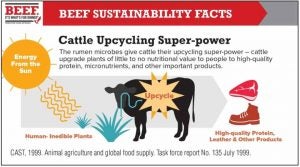Recent reports question beef’s role in a healthy, sustainable diet. Beef is healthier and more sustainable today than at any point in time. History and well-established research have consistently shown that practical, balanced dietary patterns grounded in science promote health and sustainability, not eliminating single foods, like beef.
The U.S. is the leader in sustainable beef production. Research recently conducted by the USDA’s Agricultural Research Service and The Beef Checkoff found that data commonly used to depict beef cattle’s environmental impact in the U.S. is often overestimated.
- Beef production, including the production of animal feed, is responsible for only 3.3 percent of greenhouse gas emissions in the U.S..
- Corn used to feed beef cattle only represents approximately 9 percent of harvested corn grain in the U.S., or 8 million acres.
- On average, it takes 308 gallons of water, which is recycled, to produce a pound of boneless beef. In total, water use by beef is only around 5 percent of U.S. water withdrawals
Not only does this data demonstrate that cattle’s environmental impact is less than often reported, thanks to cattle’s unique digestive system they can actually help mitigate food waste.
Sara Place, Ph.D., Senior Director of Sustainable Beef Production Research for the National Cattlemen’s Beef Association said, “At the end of the day, cattle generate more protein for the human food supply than would exist without them because their unique digestive system allows them to convert human-inedible plants into high-quality protein.”
Beef supplies essential nutrients and promotes health in a uniquely efficient way.
A 3-ounce serving of lean beef provides 10 essential nutrients in about 170 calories, including high-quality protein, zinc, iron and B vitamins. No other protein source offers the same nutrient mix. Furthermore any one of the nearly 40 cuts of beef considered lean can be included as part of a heart-healthy diet to support cardiovascular health, according to recent research from Purdue University.
Additionally, research has consistently demonstrated that the nutrients in beef promote health throughout life. In particular, the protein, iron, zinc and B-vitamins in beef help ensure young children start life strong, building healthy bodies and brains. Protein is also especially important in aging populations due to its ability to help build and maintain muscle. After 50 years of age, adults are at risk for losing muscle mass, leading to falls and frailty that affect their ability to age independently.

More information on beef, including its role in a healthy, sustainable diet can be found here.


